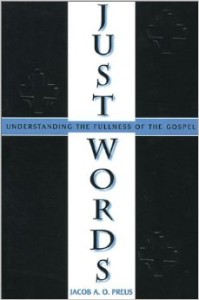The Lord be with you
Some books you read are quickly forgotten. It isn’t that they are bad books; it is just that they don’t make enough of an impact to stay with you. Then there are books that you read which you remember. Five, ten, or more  years later, you still recall the content; you still tell others about it; you still recommend it. Just Words: Understanding the Fullness of the Gospel, by Jacob A. O. Preus (1920-1994) is one of those books that stay with you.
years later, you still recall the content; you still tell others about it; you still recommend it. Just Words: Understanding the Fullness of the Gospel, by Jacob A. O. Preus (1920-1994) is one of those books that stay with you.
I read it well over ten years ago, and have recommended it to numerous people. In general, the book examines the various metaphors used in the Scriptures to describe the work of Christ. They are grouped in categories. So, under the category of “Christ the Life-Giver: Creation Metaphors,” Preus deals with the ideas of birth, life, salvation, light, bread and water. Under the category of “Christ the Redeemer: Commerce Metaphors,” Preus handles the metaphors of ransom, redemption, property and forgiveness/remission. Under the category of “Christ the Judge: Legal Metaphors,” Preus considers the metaphors of justification, intercession, adoption, inheritance.
Other major categories are: “Christ the Reconciler: Personal Metaphors;” “Christ the Priest, Christ the Lamb: Sacrificial Metaphors;” “Christ the Savior: Deliverance Metaphors;” and “The World Mission and the Gospel’s Words.” The opening two chapters give a solid foundation for the rest of the book. In short, the Gospel is communicated to us by words. Words are used by God as a means to give us the blessings he has for us.
Each chapter begins with a short story that helps us understand why this particular metaphor is used and in what settings it might be most helpful. So, for example, as you seek to comfort someone who has just lost a loved one in a tragic automobile accident, the metaphor of justification might not bring comfort as well as the metaphor of new life. A person dealing with depression might respond better to a light metaphor then to a cleansing metaphor.
 Think of the work of Christ as something three-dimensional, like Michelangelo’s statue of David. Though it is the same statue, when you look at it from different vantage points different things are seen. It might even look like a different statue. In the end, though, it is the same work of art. So the work of Jesus takes on different accents, depending on the vantage point of the viewer.
Think of the work of Christ as something three-dimensional, like Michelangelo’s statue of David. Though it is the same statue, when you look at it from different vantage points different things are seen. It might even look like a different statue. In the end, though, it is the same work of art. So the work of Jesus takes on different accents, depending on the vantage point of the viewer.
Another great value of this book is that it provides insight into various denominations. You see, often denominations have a preferred way of speaking about the work of Christ. So one group of Christians will speak of being “saved” while another will speak of being “justified” and still at third will speak of being “born again.” This book will help you understand what is behind a denominations’ favorite metaphor, and help all believers appreciate what the favorite metaphor of a different denomination brings to the discussion about our common Lord Jesus.
This book receives my highest recommendation. It is readable by all with a high school education.
Just Words: Understanding the Fullness of the Gospel
Jacob A. O. Preus
235 pages (counting the appendix)
Concordia Publishing House
Blessings in Christ
Pastor Rickert
